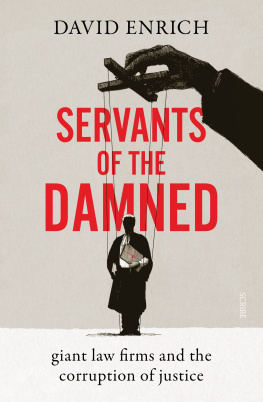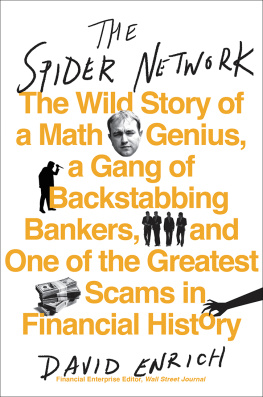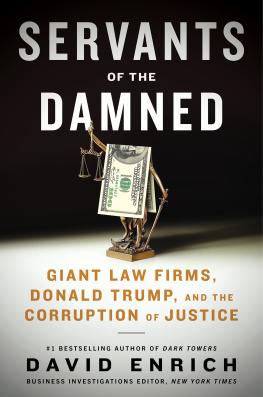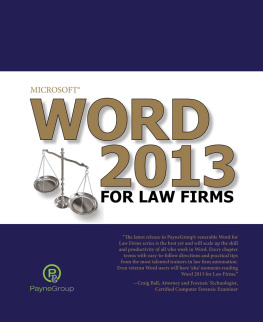
SERVANTS OF THE DAMNED
David Enrich is the Business Investigations Editor at The New York Times and the #1 bestselling author of Dark Towers . He previously was an editor and reporter at The Wall Street Journal . He has won numerous journalism awards, including the 2016 Gerald Loeb Award for feature writing. His first book, The Spider Network: how a math genius and gang of scheming bankers pulled off one of the greatest scams in history , was shortlisted for the Financial Times Business Book of the Year award. Enrich grew up in Lexington, Massachusetts, and graduated from Claremont McKenna College in California. He currently lives in New York with his wife and two sons.
Scribe Publications
1820 Edward St, Brunswick, Victoria 3056, Australia
2 John St, Clerkenwell, London, WC1N 2ES, United Kingdom
Published by Scribe 2022
Copyright David Enrich 2022
All rights reserved. Without limiting the rights under copyright reserved above, no part of this publication may be reproduced, stored in or introduced into a retrieval system, or transmitted, in any form or by any means (electronic, mechanical, photocopying, recording or otherwise) without the prior written permission of the publishers of this book.
The moral rights of the author have been asserted.
Scribe acknowledges Australias First Nations peoples as the traditional owners and custodians of this country, and we pay our respects to their elders, past and present.
978 1 922585 54 7 (Australian edition)
978 1 914484 46 9 (UK edition)
978 1 922586 77 3 (ebook)
Catalogue records for this book are available from the National Library of Australia and the British Library.
scribepublications.com.au
scribepublications.co.uk
To Peggy and Peter Enrich, who instilled in me a fascination with psychology and the law.
In memory of Alan Osur, a reliable source of facts, wisdom, and dad jokes.
I came to feel that the American lawyer should regard himself as a potential officer of his government and a defender of its laws and Constitution. I felt that if the time should ever come when this tradition had faded out and the members of the bar had become merely the servants of business, the future of our liberties would be gloomy indeed.
Henry Stimson, secretary of war and state, in his 1947 memoir
From handguns to tobacco, Jones Day defends the powerfully damned and the damned powerful.
American Lawyer magazine, January 2004
CONTENTS
Prologue:
PART I
PART II
PART III
Epilogue:
AUTHORS NOTE
The information in this book comes largely from my interviews with more than 180 people. Most were current or former Jones Day lawyers, but they also included judges, opposing attorneys, witnesses, and others who have interacted with Jones Day or had notable experiences with the legal industry. Many, fearful of the professional consequences of discussing a powerful, secrecy-prizing law firm, spoke on the condition that I not identify them as sources. Othersincluding those whom Jones Days leaders authorized to answer my written questionswere on the record.
When faced with conflicting accounts of specific incidents, I used the descriptions that struck me as the most plausible, based on factors including the credibility of different sources. In some cases, I have included dissenting accounts in the text or footnotes.
In addition to interviews, I drew on court documents, oral histories, family scrapbooks, university archives, academic research, many books, and contemporaneous media reports, as well as internal emails, memos, and other materials that I obtained via sources and Freedom of Information Act requests. These are detailed at the end of the book.
PROLOGUE
POWER PLAY
O n a chilly evening in January 2017, shortly before the inauguration of Donald J. Trump, a large crowd gathered in Washington, D.C., for an extraordinary celebration. A procession of judges, senators, congressmen, and conservative power brokers trooped up to the top floor of a neoclassical art deco building near the United States Capitol. The eighty-two-year-old edificeoriginally the headquarters of the Acacia Life Insurance Companywas designed by the same architects behind the Empire State Building. A pair of limestone griffins, each clutching eggs, guarded the twenty-two wide steps that led to the buildings main entrance on Louisiana Avenue. Green marble columns loomed inside the cavernous lobby. Upstairs, the floors luxuriated under twelve-foot ceilings, and wood-paneled offices and conference rooms, some equipped with fireplaces, afforded breathtaking views of the Capitol dome.
The law firm Jones Day occupied the building. Founded in 1893 in Cleveland, it had grown into one of the planets largest legal machines, with thousands of attorneys spread across dozens of offices in the U.S. and overseas. Cleveland had long since faded as a locus of power, which these days resided in Washington. There was no clearer sign of that shift than the men who were being honored this January night: These were the lawyers who were leaving Jones Day to join the new Trump administration, where they would exert tremendous sway over the course of national events.
Jones Days leader was a headstrong, bulldog-faced attorney named Steve Brogan. He was a religious man and the son of a New York City cop, and after faith and family, the law firm was his life. Brogan loved Jones Day, and he wielded unfettered power. He controlled who Jones Day hired, how much employees were paid, where the firm opened offices, and even who would succeed him as managing partner. (Technically, there were a pair of committees that could overrule such decisions, but they had never done so.) Brogan was kingor, as more than a few of his colleagues described him, the godfather.
Brogan very much liked the Acacia. That is one great building, he had gushed shortly after signing the lease. (Jones Day beat out the Securities and Exchange Commission, which also had been eyeing the location.) Brogan ensconced himself in a suite so palatial that a colleague warned him that it would create the impression that Brogan viewed himself as emperor, not a member of a partnership. Brogan kept the office.
Soon after Brogan took over the firm in 2003, Jones Day had set out to greatly enlarge its ranks of Washington lawyers, in keeping with the firmsand the industrysgoverning principle over the past few decades, which boiled down to more lawyers, more offices, more clients, more money, more power.
Thanks to those wonderfully high ceilings, though, there wasnt space in the Acacia to cram in many more lawyers. In 2004, architects and engineers proposed leveling a neighboring parking garage to make way for a gleaming, twelve-story office annex. It would be connected to the Acacia by a triangular, glass-enclosed atrium and a series of translucent skywalks etched with the names of cities in which Jones Day operated.
The plans called for a zoning variance that would allow the new structure to exceed the areas 110-foot height limit by at least twenty feet. This was when the problems began. Law enforcement agencies, still skittish after 9/11, warned that the roof was so high that it could provide snipers with an ideal nest from which to pick off senators. The buildings developers didnt deny that gunmen would have a clear line of sight onto the Capitol grounds; instead, they pointed out that there were plenty of other nearby sites that also would be suitable for assassination attempts. This was a less-than-persuasive argumentsurely, creating additional platforms for snipers was undesirable, even if other options existedbut D.C. zoning bodies approved the plans.
Next page









